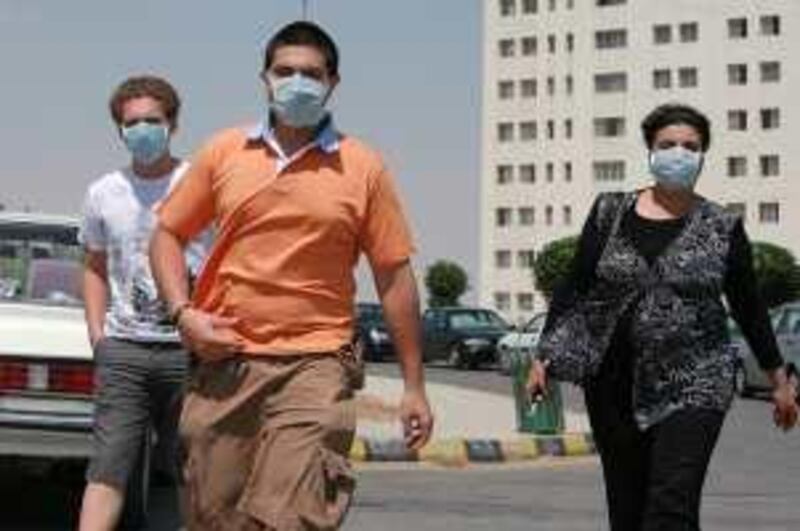AMMAN // For many Jordanians celebrating Eid this week, there aren't going to be the usual kisses on the cheeks when they greet each other, just a handshake. A government-issued fatwa has urged citizens to refrain from the social ritual in the country's latest attempt to fight the spread of swine flu, which has so far infected 286 people. The fatwa, published on the website of the state news agency Petra on Thursday, comes three days before the holiday, and amid fears that the pecks on the cheeks during social gatherings could rapidly spread the virus. "If kisses are going to lead to the possibility of spreading the disease, then they are not religiously sanctioned," it said. The fatwa, issued by the government's department of IFTA, also encouraged Jordanians to use the Eid holiday to stop greeting kissing altogether unless in exceptional cases such as when someone returns from abroad. Since the H1N1 flu was declared a pandemic in June, there have been no reported deaths in Jordan. The government treats those infected free of charge at one of its hospitals and has also set up a hotline to answer questions about the virus. In its efforts to combat swine flu, the ministries of health and education issued regulations that require classrooms to be closed if just one student becomes infected, and the entire school if at least two cases are discovered within two weeks of each other. Educational brochures that recommended diligent hand washing, among other hygienic practices, were distributed in public schools during the past few weeks. Several schools were shut down this month after 92 students were diagnosed with the virus, two-thirds of them were 13 years old, according to the health minister, Nayef al Fayez. The government has also extended the Eid holiday for schools from four days to nine, hoping that the virus would be contained by the time they reopen. With jittery parents reluctant to send their children to school, and Jordanians rushing to buy surgical masks, both Mr al Fayez and Walid Maani, the minister of education and higher education, appeared on the popular 60 Minutes talk show on Friday night, seeking to allay the public's fears. "Our hospitals are open 24 hours a day. I am asking citizens not to panic. The swine flu is just like any other flu ... we expect more cases but the situation is under control," Mr al Fayez said. The latest precaution, which targets kissing, although hailed by health experts as a positive step, is bound to create socially awkward situations when people's kisses are rejected, which is why it required a religious fatwa to become legitimate. "The fatwa is very important and came at the right time," Hussein al Khozahe, a sociologist and an expert in developmental studies at the Al Balqa Applied University, said. "There is a chaos of kissing in Jordan. When you visit someone and kiss him, you end up kissing 20 others at the same gathering. We are afraid of the embarrassment when someone rejects the kiss. But the fatwa ... will put an end to the social embarrassment. "An Arab citizen who lives for 65 years, spends 336 hours of his [life] kissing. And not all social kisses are sincere. For the loved ones, a hand shake with a pat on the shoulder should do." Ahmed Abu Khalil, a columnist for Arab Alyawm, an independent daily, wrote that because of the fatwa, this Eid there will be a greater potential for awkwardness and misunderstanding between family and friends. "This Eid is going to be more sensitive after it was officially announced that kissing is not favourable," he wrote yesterday. "If you do not initiate the greeting with a kiss, and if you do not reciprocate, this would mean that you think that the other person is ill and that you are afraid of catching the disease. "It would rarely be interpreted that you are careful about spreading the disease." But cheek kissing isn't the only social practice that needs a fatwa to convince people to stop doing it. There is the tradition of offering bitter coffee from the same cup during Eid, weddings and funerals, and also mansaf, the traditional meal most people eat with their hands from the same large dish. Emad Hajjaj, the country's leading cartoonist, predicted that the customs would become problematic in the wake of swine flu, publishing a cartoon in Alghad daily depicting Abu Mahjoob, a famous Jordanian cartoon character with plastic covered lips and disposable patches on his cheeks while holding a hose for coffee and coffee cups that decompose after their first use. Even with religious justification to lessen the embarrassment, some have found that forgoing the customs may prove difficult. "The priest told us last week 'please do not kiss each other', but when we went out, all the women greeted each other with kisses, so I did the same, although I was reluctant at first," Suhaila Sunna, a housewife, said. "We got used to kissing and it is difficult to stop this habit." smaayeh@thenational.ae
Fatwa urges handshakes, not kisses
Jordanian authorities aim to keep the swine flu pandemic from escalating over Eid by persuading people to minimise contact.

Editor's picks
More from the national




